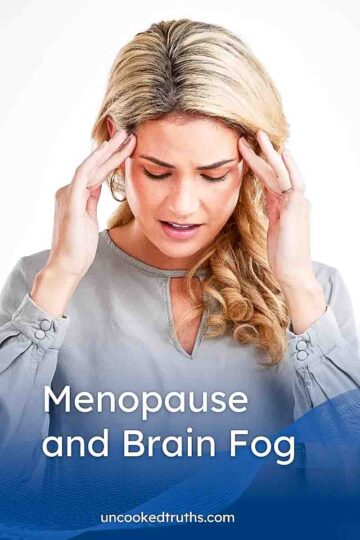There was no grand announcement. No warning shot across the bow, just a quiet shift. One day, I looked in the mirror and didn’t quite recognize the person staring back, but not because of wrinkles or gray hair; those are expected. It was something deeper. A slow reshaping of who I was, inside and out.

Jump to:
When Your Body Starts Sending Weird Signals
Suddenly, your body becomes a source of daily surprises. There’s that strange knee pain that showed up out of nowhere. The foods you used to love now make you bloated or queasy. Clothes fit differently by afternoon, even if nothing else has changed. And every new symptom leads to a wild-goose chase of Google searches and shrugged shoulders. Insomnia, hot flashes, vertigo, cold chills (those are really fun), and much more.
What’s harder than the symptoms is how little support you get. You talk to a friend, and they’re going through their own mystery checklist. You talk to a doctor, and if they don’t dismiss you outright, they give you a vague answer that ends in “it’s just age.” It’s frustrating, it’s isolating, and it makes you feel like you’re the only one.
Weight Gain Without a Warning Label
Let’s talk about belly fat. I used to carry extra weight in predictable places. But post-45? Everything settled right in the middle. Like my abs just gave up and made room for fat. I was told to eat less and move more. Cute, but I was already doing both.
Around 40, I started experiencing muscle pain and unexplained weight gain. Doctors blamed everything but hormones, suggesting I was lazy, depressed, or just aging. I kept digging. I saw gynecologists, endocrinologists, and even homeopaths.
I was told I had fibromyalgia and prescribed muscle relaxants and antidepressants. I refused them, because deep inside, I knew that wasn’t the answer. I was never told about hormone replacement, even though I was in pain and barely functioning.
Eventually, I ended up with insulin resistance, walking around prediabetic, exhausted, and inflamed. I wasn’t imagining it, but no one took it seriously. “Here, take some Metformin and eat less.”
What I needed was a different approach, like more protein and more fiber. Stabilizing blood sugar before chasing weight loss. Learning how to eat in a way that supported my body, not punish it. Oatmeal made me hungrier, chicken and veggies weren’t enough. Over the years, I fought to lose weight, and it took trial, error and a lot of unlearning, but slowly, I figured out what actually worked for me.
When Sleep Becomes a Luxury
I used to sleep like a cat in a sunbeam. Then menopause hit, and I didn’t sleep for four years. I tried every gentle remedy under the sun. Nothing worked. The insomnia brought hot flashes, high blood pressure, and brain fog so thick I could barely finish a sentence. I left a job I loved because I could no longer think clearly.
One day, a doctor finally prescribed HRT. I applied estrogen in a spray form on my skin and fell asleep for four solid hours, with no hot flashes. I woke up and cried. My husband checked on me because he hadn’t seen me sleep like that in ages. It wasn’t a cure-all, but it was a turning point. For the first time in years, I felt like myself again.
The Midlife Strength Shortage
There’s also this sneaky thing that happens: you start to feel physically weaker, and not just in the gym, but in life, in usual tasks like carrying groceries, standing too long, or opening jars. You lose muscle faster, and building it back feels like dragging yourself uphill.
And yet, everyone says, “Just do strength training!” as if it’s that easy. I tried. I did yoga, tai chi, and light weights. The muscle soreness was so intense that it knocked me out for days. Turns out, “no pain, no gain” doesn’t work when your body is already screaming.
Related: The Many Faces of Menopause: Symptoms No One Warned You About
Strength Training... but Make It Make Sense
Doctors love to say, “You need to lift weights.” Great. But they never explain how. What kind, how heavy, how often? For women who didn’t grow up with a gym routine, this advice feels more like a riddle than a plan.
I wasn’t new to movement; I was walking, taking yoga classes, Zumba dance (I hated it), tai chi, and even gave light strength workouts a try. But the pain afterward was intense. I wasn’t being lazy. I was in real, body-screaming pain. And walking into a gym full of guys bench-pressing small cars? Let’s just say it didn’t help.
Many of us skip strength training not because we don’t care, but because we don’t know where to start. We need more approachable spaces, better guidance and education, and fewer assumptions that we’ve got a personal trainer stashed in the pantry.
What’s helped me? Short home workouts with bodyweight or resistance bands. Learning at my own pace. Accepting that consistency matters more than intensity. And most importantly: listening to what my body says after, not just during.
Read more about When Your Body Says ‘No Thanks’ to Exercise.
So, Is This Normal?
Here’s the honest answer: yes and no. Everyone’s midlife looks different, but the confusion, the frustration, the weird little changes that no one warned you about? That part is normal. I bet your mother or grandmother never talked to you about any of this, as they just pushed through without help or empathy.
What helped me the most was finding other women willing to talk about it. Not in a clinical, textbook way, but over coffee, in words that said, “Is this happening to you too?” It was not easy; many people didn't even want to discuss it, because they felt like it was a sad subject they didn't want to approach.
You’re Not Alone, and You’re Not Broken
If your body feels foreign, if your energy disappears for no reason, if you're eating salad and gaining weight anyway, you’re not crazy. You’re just in transition, and it’s not a flaw or a failure. Midlife isn’t the end of anything, it’s a shift. Your body is speaking a new language, and you get to decide how to listen. If the body changes, we need to change our ways of doing things as well and adapt.
Let’s Keep the Conversation Going
If anything in this article made you nod, roll your eyes, or say, “Finally, someone said it,” I’d love to hear from you. Leave a comment, send a message, or just sit with it for now. We’re figuring it out together. One uncooked truth at a time.
Helpful Reads From the Blog
- Welcome to Uncooked Truths
- HRT and Mounjaro: Finding Balance in Midlife
- The Truth About GLP-1s and Who Deserves Them
- Confessions from the Other Side of 50






Leave a Reply